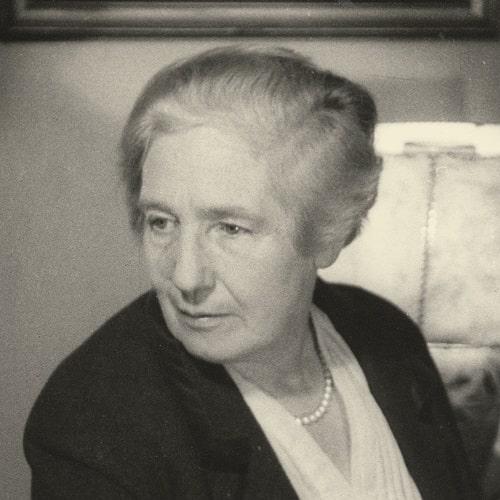Honor Smith will be remembered for her generous hospitality and gusto for lively conversation, as well as for her major contributions to the care of patients with meningitis. She was born at Rolls Park, Chigwell, Essex, at one time the home of William Harvey, the sixth of seven children of Vivian Hugh Smith (later Lord Bicester) and Lady Sybil Mary McDonnell, daughter of the sixth Earl of Antrim. Her father came from the dynasty which had founded Smith Bank at Nottingham and had himself been a prominent figure in Morgan Grenfell, before his governership of the Royal Exchange Assurance company, and lord lieutenancy of Oxfordshire. He had had a passionate interest in steeple-chasing and hunting all his life, a passion which he passed on in full to his medical daughter who regularly hunted on a Wednesday in her medical student days and was found, not uncommonly, in hunting kit when seeing patients on a Saturday in her consultant years at Oxford.
Her mother's friendship with Lady Barrett, dean of the London School of Medicine for Women, is likely to have influenced Honor’s decision when aged 25 to choose to enter medical school at the Royal Free rather than to become master of hounds of the Bicester hunt. She had been educated by a private tutor, or, as she claimed, by her father's grooms and his library. After matriculation (unusual for a woman of her background and generation) she was presented at court and travelled widely before beginning a career in medicine.
After the then unusual step of taking an intercalated BSc in 1937 she applied her deep knowledge of Shakespeare in the annual student show The deep damnation of his taking off - a brilliant take-off of senior surgeon, Cecil Joll. Frances Gardner [Munk’s Roll, Vol.IX, p.189] took the part of the thyrotoxic patient "whose eyes, like stars, start from their spheres". One April Fools Day Honor dressed in layers of antiquated and almost impenetrable underwear and appeared as a very deaf outpatient in Alfreda Baker’s clinic, Miss Baker having been not overly tolerant of those who could not undress briskly and frankly irritated by the deaf.
Honor’s first job after qualifying was at the Elizabeth Garrett Anderson, but she was soon to join Herbert Seddon’s peripheral nerve injury unit in Oxford where she worked for a time in a team which included J Z Young and Peter Medawar. An appointment in Hugh Cairns’ neurosurgery unit followed and it was there with Cairns and Ritchie Russell that her major contribution to the management of meningitis began. A pioneer in the use of intrathecal penicillin in the care of pneumococcal meningitis, she produced results unrivalled anywhere in the world due in considerable measure to the meticulous care she gave her patients who were visited never less than three times a day. Later she became internationally renowned for her contributions to the management of patients with tuberculosis meningitis. She and Ritchie Russell, proponents of the need for intrathecal therapy in meningitis, also flirted with the use of intrathecal purified protein derivative in multiple sclerosis. She had wished to assess her results using control patients, but Ritchie Russell dissuaded her; subsequent criticism led to abandonment of the project.
After a Rockefeller fellowship in the Boston Sick Children’s Hospital in 1948 she returned to Oxford where she became consultant neurologist and physician in charge of the tuberculosis meningitis unit and was May reader in medicine. In 1959 she went to Morocco with John Spalding on behalf of WHO to advise on an outbreak of an epidemic of paralysis quickly traced to contaminated cooking oil. It was her outstanding contribution to the management of tuberculosis meningitis that led to the award of the OBE in 1962. Throughout those years she developed her work in clinical neurology, publishing many papers on meningitis and on multiple sclerosis. She retired in 1971.
Between 1950 and her death she was in succession senior research fellow, additional fellow and ultimately honorary fellow of St Hugh’s College, Oxford, where she was also gardening steward, a post which gave her delight.
These bare bones say too little about the remarkable personality of Honor Smith. Her students recall indelible and treasured memories of her teaching and the figure of a handsomely rounded head with springing reddish hair thrusting ahead of a body which wore a flapping white coat over nondescript clothes while one arm clamped a handbag to her side. Her patients worshipped her as much as did her students. There are many who recall her sharp and racy wit and her rollicking laughter with its Rabelaisian overtones were a clear call to gatherings after ward rounds where the most fun was to be had. She was a formidable raconteuse and marvellous company when the time came for relaxation, either at her house in Park Town or in ‘the lady’s chapel’ at the Horse and Jockey near the Radcliffe Infirmary to which a small band of worshippers would repair on a Sunday morning after visiting their patients.
After retirement she went to live in Herefordshire. There she created a garden out of a wilderness and had time to indulge her taste for fishing, catching her last salmon at the age of eighty. She realized, she said, that she was in heart failure when she could no longer land a large fish.
J G G Ledingham
[Brit.med.J., 1995,311,448-9; The Independent, 25 Feb 1995]

